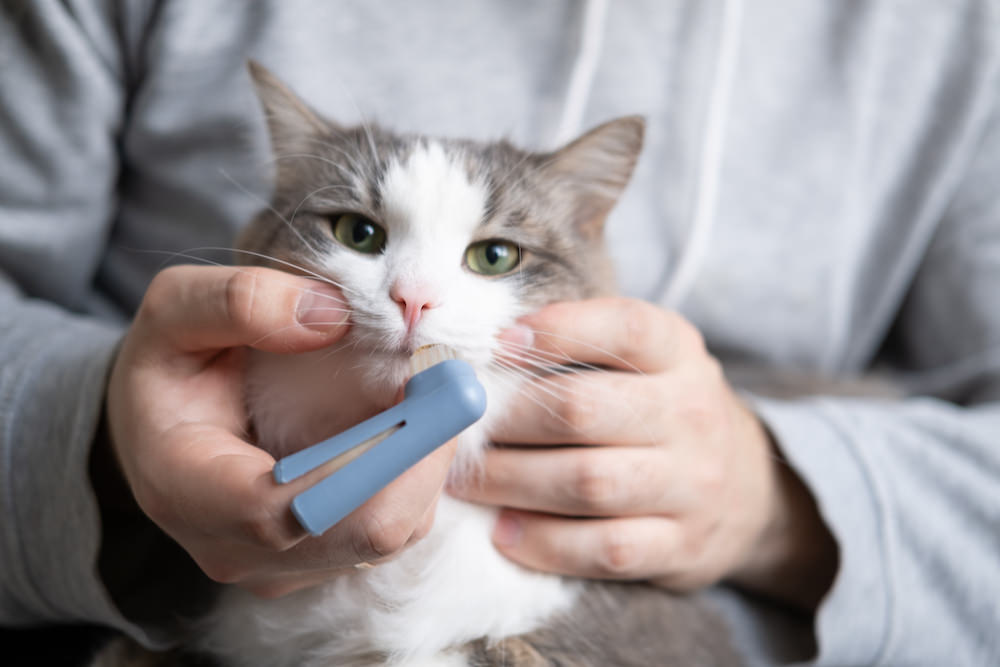
Does your cat’s breath keep you from snuggling? Do you wish you could give your dog a mint? Contrary to popular belief, “doggy breath” is not normal and could be a sign that your furry friend is developing dental disease. Keeping your pet’s teeth and gums healthy is crucial for their overall health and well-being. Though expensive and not practical for everyday use, the most effective way to clean your pet’s teeth is to have our veterinarians scrape them while under anesthesia. Cleaning your pet’s teeth and gums daily at home is the best way to care for their oral health between office visits.
What is Dental Disease?
Dental Disease is a painful condition that occurs when bacteria, plaque, and tartar build up on the teeth and get trapped under the gumline. Bacteria can be absorbed into the bloodstream and cause damage to major organs throughout the body. Sadly, dental disease begins early and by the age of three, most dogs and cats already have some traces of it. Early signs of dental disease include bad breath, yellow tartar buildup, and swollen gums. It’s important to pay close attention to your pet’s oral health, as they are unable to tell us when they are uncomfortable or in pain. Routine dental care can decrease the potential of dental disease, thus increasing your pet’s quality of life.
Visit Your Veterinarian
Regular professional cleanings in our office are an essential way to protect your pet’s oral health. Our doctors and technicians can identify, prevent, and treat any problems that otherwise may go unnoticed. Dental cleanings involve x-rays to evaluate your pet’s dental health and anesthesia to effectively clean their teeth and gums. Yearly oral exams as part of your pet’s check-ups should be a priority.
How to Keep Your Pet’s Teeth Clean at Home
Though efficient and effective, it’s not practical to bring your furry friend into the clinic every day for a cleaning. Oral care at home is an essential part of taking care of your pet’s health. Daily brushing with an animal-safe toothpaste (which is available in favors that pets enjoy, such as chicken and beef) is the best way to keep tabs on their oral health and can prevent potentially expensive procedures down the road.
A lifetime of excellent dental care begins when your pet is very young. Even though kittens and puppies lose their baby teeth, it’s important to start brushing and feeling their teeth with your fingers at a young age to get them accustomed to regular, daily brushing. If you adopted your pet as an adult, it’s never too late to start. You still have time to develop a regular brushing routine, it just may take longer to establish. Regardless of the age you begin, it’s always important to make brushing a positive experience, so reward your pet with healthy treats after each home cleaning session.
If your pet runs at the sight of a toothbrush – don’t fret! There are other ways to keep their teeth and gums healthy such as dental spray, a fresh diet, and chews. Dental spray can reduce and prevent dental plaque as well as control the bacteria that causes bad breath. A diet rich in healthy, fresh ingredients tends to help improve your pet’s overall health, including their dental health. Chew toys and dental chews (we don’t recommend bones as they can splinter and penetrate the GI tract causing major and or life-threatening issues) all help to scrape the plaque and tartar from your pet’s teeth while simultaneously satisfying their primal instinct to chew. Always choose size-appropriate chews and supervise your pet to ensure they don’t choke or swallow any pieces.
Oral hygiene is just as important for your pets as it is for you, as poor oral health can lead to serious life-threatening conditions. Practicing regular dental care at home will lead to sweeter smelling breath and kisses as well as a happier, healthier, and longer life for your pet. Cleaning your furry friend’s teeth is easy – even the busiest pet owners can incorporate good dental practices with just a few minutes each day so your pet’s pearly whites will sparkle for years to come.
If you have any questions or want more information about providing at home oral care for your pet, please let us know. If you suspect your pet has an issue with their oral health, the veterinary team at Sierra Veterinary Hospital are trained and ready to provide you with professional care and a treatment plan.


